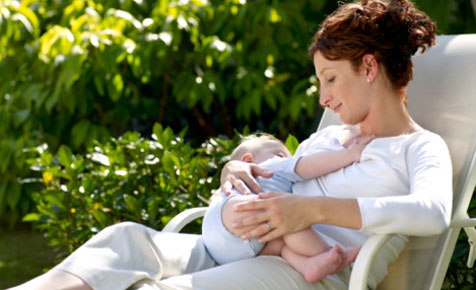The amount of calories that a nursing mother needs depends on her own physiology, her pre-pregnancy weight, how much weight she gained during pregnancy, level of exercise and whether her infant is breastfeeding exclusively or not. This guide will provide you with some general information that will answer your question of “how many calories do I need while nursing?”

General Considerations About Breastfeeding Calories
So, how many calories do you need while nursing? Most breastfeeding women need to have approximately 500 more calories per day than those women who are not breastfeeding. The usual breastfeeding calorie intake daily is between 2,000 and 2,500 for women who wish to maintain their weight.
While breastfeeding it is important for a new mom to pay attention to her body. Focus on hunger cues, not necessarily a specific number of calories. Eat whenever you feel hungry and focus on maintaining a balanced and nutritious diet. As your body is so efficient at producing milk, eating when you’re hungry is acceptable, as your body may have laid down fat stores for later use during your pregnancy. Breastfeeding can actually help to use up these extra stores.
As a woman’s body may change rapidly in the following months after giving birth and as breastfeeding patterns may change as your baby grows, the exact amount of breastfeeding calories that is needed may change over the course of your experience.
Breastfeeding women tend to have a bigger appetite than their counterparts. If you don’t feel like eating, it could be a sign that your body is not regulated. By this, it is could simply mean you should seek additional emotional support. Women with postnatal depression at times lose their appetite and if you’re finding it a struggle to eat, you should seek the advice of you physician.
As a breastfeeding mother, you need to be cautious about cutting calories. Cutting calories by more than 25% may interrupt your milk supply. Any time you wish to decrease your caloric intake, this process should be done gradually over time. Consuming too few calories while breastfeeding may leave you malnourished as well as affect your milk supply.
What Foods to Incorporate in Your Breastfeeding Diet
As you eat well during your pregnancy, you will need to continue to consume extra calories during breastfeeding as well to maintain the right balance of the good and not so good for you food. Try to incorporate the following food sources each day:
Protein – 3 servings
Calcium – 5 servings
Iron-rich Foods – 1 or more servings
Vitamin C – 2 servings
Green Leafy Vegetables and Yellow Vegetables – 3 to 4 servings
Yellow Fruits – 3 to 4 servings
Other Fruits and Vegetables – 1 or more servings
Whole-grains and other Complex Carbohydrates – 3 or more servings
High-fat Foods – Small amounts, less than you consumed during pregnancy
Be sure to consume at least eight cups of water, juice or other caffeine free and alcohol free beverages.
DHA-rich foods promote the growth of you baby’s brain. Good sources include wild salmon, sardines and DHA-enriched eggs.
You should also continue your daily prenatal vitamin.
If you are concerned about your weight, it is possible to start decreasing calorie intake to about 1,800 calories per day once your baby has reached the age of 2 months. If you cut calories before this, your milk production may be affected.
You may find that while eating a regular diet, you lose weight as this is true of breastfeeding moms. However, losing more than 1-2 pounds per week could indicate that you are not getting enough calories.
In conclusion, the answer to "how many calories do I need while nursing" on a daily basis varies based on your physiologic needs. An average of an extra 500 calories per day is recommended, however, it is also important for you to listen to your body and follow your hunger cues as well as maintaining a well-nourished and balanced diet.
Also, keep in mind that having a newborn requires you to need plenty of energy. Trying to lose weight or cutting calories too soon after giving birth may prolong your recovery and affect your energy levels. It is recommended that you wait until after your postnatal check before you start to be concerned with weight loss and reducing caloric intake. As always, seek the advice of your physician.
- 1.
- 2.
- 3.

View All Comments /Add Comment